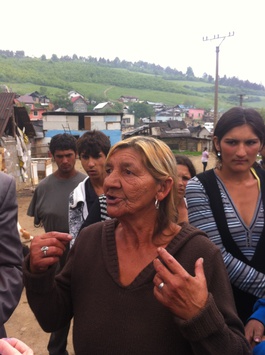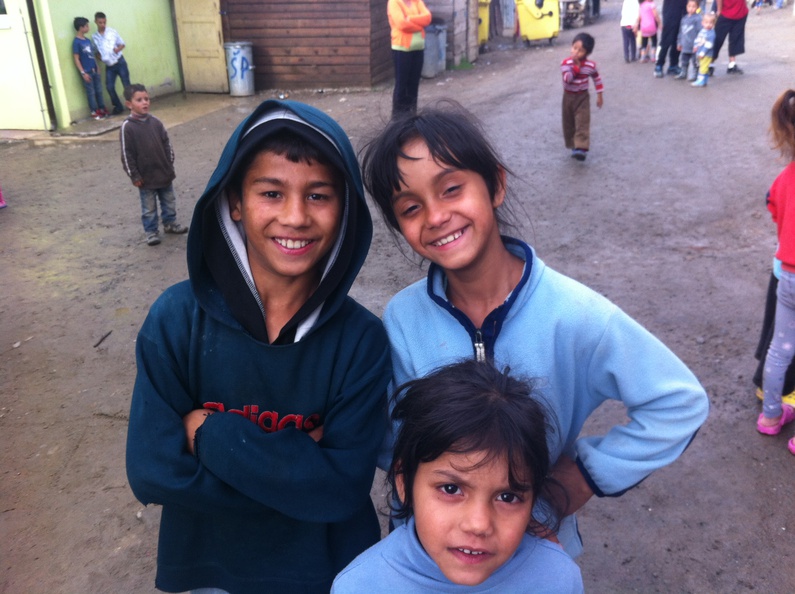
Roma school, Slovakia: ‘When I grow up I want to be a housekeeper’
Published on
A significant proportion of the EU’s structural funds is earmarked for supporting the social inclusion of marginalised groups. But somewhere between the funding level, the responsibility for doling out the money – which lies at the national level – and the projects local authorities have to apply for and implement, something is going wrong
 Nested in the idyllic green of the eastern Slovakian countryside is a settlement of some 1, 700 Roma, who make up almost eight-tenths of the village population but have little say in the local government. The doors of the makeshift houses – if any – are falling off their hinges; the surrounding grass has been trodden into a muddy bog. The average temperature in January is -5 degrees celsius. 'We want homes like other people, with bathrooms and running water,' says a 69-year-old woman, who has been living in the settlement since she married into the community at the age of 16. ‘We want to be treated like everyone else is.’
Nested in the idyllic green of the eastern Slovakian countryside is a settlement of some 1, 700 Roma, who make up almost eight-tenths of the village population but have little say in the local government. The doors of the makeshift houses – if any – are falling off their hinges; the surrounding grass has been trodden into a muddy bog. The average temperature in January is -5 degrees celsius. 'We want homes like other people, with bathrooms and running water,' says a 69-year-old woman, who has been living in the settlement since she married into the community at the age of 16. ‘We want to be treated like everyone else is.’
FUNDS
Talking to both young and old members of the community, it is unsurprising to find that education is not on their list of priorities. Nonetheless, just across the small road that leads to the settlement is a large container of the kind usually seen on building sites, a special school that EU funding helped to set up. All the pupils in this school are Roma. They’ve been sent here on the basis of diagnostic tests, says the principal.
Video by Amnesty
Slovakia scored highest in a recent eurobarometer poll of how uncomfortable Slovaks thought their compatriots would feel if their children had Roma schoolmates. A survey*, published in 2012, of more than 80, 000 Roma and their neighbours from the majority population in the eleven EU member states with the largest number of Roma, demonstrated that in Slovakia, under one-third of Roma aged 20 to 64 is in paid employment. That is less than half the proportion for the majority population. Almost 90% of Roma households were at risk of poverty.
While it is a positive sign that the local authority applied for the funding to establish and build the school, and find the teachers (none of whom are Roma themselves), the concept of ‘special schools’ filled with Roma children is more than problematic. Slovakia has been criticised for not doing more to integrate Roma pupils into mainstream schools. The de facto segregation reinforces old prejudices and stereotypes. What would the Roma schoolchildren themselves like to work as when they leave school? Only two of the ten pupils in the class raise their hands. But they don’t answer with ‘scientist’, ‘teacher’ or even ‘footballer’, as many their age would elsewhere in Europe. ‘A blacksmith,’ says the boy. ’A housekeeper,’ says the girl. People without running water and holes in their roofs are concerned with survival, not designing grand strategies for their future.
SETTLEMENTS
42 km away, local authorities have been working to integrate the Roma population in another settlement for years. Although the fact that in this town Roma make up only 20% of the population makes a difference, there are other, more important distinctions - such as how the funding has been used, for example on housing construction and employment training schemes. Many children go to a mixed primary school together with Slovak pupils. Some smaller children attend classes at a local community centre. The small houses in the settlement don’t have enough rooms for the community, which has a high fertility rate (some women have nine or even ten children). But they are built of breeze blocks and have running water; many have satellite dishes fastened to the outside walls. There is no sign of the wanton destruction of permanent housing that figures so highly in popular clichés about the Roma. Could this be due to the fact that the project obliged the future tenants to help build the houses and thereafter pay rent and utility bills?
 Priorities and pressing needs are seen very differently here. 'We want our younger generation to have jobs,' says one woman. 'That’s our future.' So Roma are motivated to take the education of their children seriously, seek work, and find it (though the economic crisis hit the country hard, with the youth unemployment rate in Slovakia hovering around 35%). However, if those with the power and the money fail to tackle discrimination, segregated schooling and social exclusion, these ambitions may never be realised.
Priorities and pressing needs are seen very differently here. 'We want our younger generation to have jobs,' says one woman. 'That’s our future.' So Roma are motivated to take the education of their children seriously, seek work, and find it (though the economic crisis hit the country hard, with the youth unemployment rate in Slovakia hovering around 35%). However, if those with the power and the money fail to tackle discrimination, segregated schooling and social exclusion, these ambitions may never be realised.
On 26 June the European commission called for member states to do more to improve the economic and social integration of the Roma. The EU has a key role to play in combating discrimination, as well as providing the funding so crucial for integration. However, national governments have to muster the political will to change the situation. Effective integration measures at the local level are also needed, together with a clear conviction that for all the differences between the majority and Roma populations in tradition and lifestyle, both belong to the community in which they have been uneasy and sometimes hostile neighbours for so long.
Finally, any policy to integrate the Roma has to involve the wishes, energies and visions of the communities themselves. And the bottom line is this: if Roma communities are to reach the same levels of education and employment as the majority population, they have to be provided with the basics that allow not just Roma, but anyone, to look past staying warm and dry and think about where they want themselves and their children to be tomorrow. Running water is just a starting point. But the second step towards integration is hard to take without the first.
*conducted by the EU’s fundamental rights agency, the united nations development programme, the world bank and the European commission
The authors work for the European union agency for fundamental rights. The opinions expressed in this article are their own and do not necessarily reflect the views of the agency



